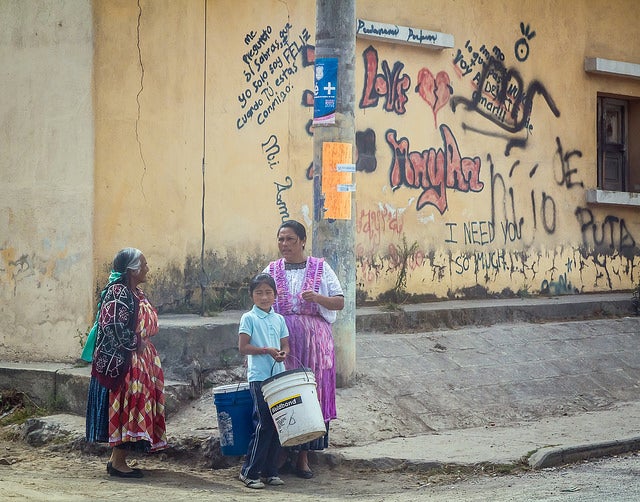Invisible women?
In predominantly male sectors like energy and urban planning, women are mostly invisible players. Women, especially in developing countries, have little say over energy choices and the use of renewable energy given that culturally, men are the primary decision-makers. And yet women are still the primary household energy managers, which means energy poverty influences their time, money, and safety.
 Emerging and Sustainable Cities Initiative, 2014 Flickr
Emerging and Sustainable Cities Initiative, 2014 Flickr
For this reason, the United Nations Sustainable Energy for All Initiative (SE4ALL) will focus on the nexus of gender and energy in 2014. At the annual SE4ALL forum from June 4-6, 2014, IDB President Luis Alberto Moreno will speak about the IDB initiative for Sustainable Energy for All for Latin America and the Caribbean (LAC-SE4ALL) and its commitment to promoting universal access to modern energy, energy efficiency, and renewable energy in the region. Speakers at the annual forum will address some of the most salient issues related to energy policy and gender.
Sustainable energy policies and urban space
Here are some examples:
- In rural areas, women experience significant health problems from the use of rudimentary wood cookstoves, and they put their safety at risk by traveling long distances to gather wood. In urban areas, as Judy L. Baker discusses in Climate Change, Disaster Risk, and the Urban Poor: Cities Building Resilience for a Changing World, women in impoverished urban areas still deal with many of these issues related to biomass cookstoves (wood, charcoal, agriculture, and animal waste), but, the larger issue is the availability of affordable efficient cookstoves and other technologies that reduce the time and money women invest in managing the household. Policies that support efficient technology and modern energy choices would expand the economic, social, and political opportunities for women in urban areas in developing countries.
- Urban women also face safety issues related to a lack of lighting in public spaces. Rates of rape, kidnapping, and murder are often the highest in areas of the city with the least lighting infrastructure. This is true, for example, in cities like Port au Prince, Haiti, where research has shown the relationship between rates of violence and lack of lighting infrastructure. Governments often choose not to invest in lighting in an effort to save money. However, were they to invest in efficient lighting by converting older lighting technologies to LEDs, municipalities could reduce costs while improving security.
Energy policies and choices very much influence the way that women experience the city. They also have a substantial influence over how women in urban areas spend their time. As the UN website states,
“The types of fuels used, the amount of energy purchased, the devices and technology chosen, as well as domestic infrastructure related to ventilation, lighting priorities, cooking, and energy based equipment purchased, are typically made by the male head of the household, but affect women’s daily lives in immediate and practical ways. There is a need for women-friendly technologies, which can free up women’s time, reduce their burden, and expand their economic, social and political opportunities.”
By focusing on how energy choices affect women, the UN and the IDB are pushing for societies to value women’s time and safety, and to make it possible for more women to be involved in the politics, design, and implementation of energy policies and choices.
Alice Driver works in communications for the Sustainable Energy for All in Latin America and the Caribbean (LAC-SE4ALL) iniciative. In 2012-13, Dr. Driver was a postdoctoral fellow at the Universidad Nacional Autónoma de México in Mexico City. She is a writer who explores issues of gender, women’s rights, and human rights with a focus on Mexico, and her work has been published by Al Jazeera, Salon, Ms. Magazine, and Women’s Media Center. Her book “More or Less Dead: Feminicide, Haunting, and the Ethics of Representation in Mexico”, is forthcoming with the University of Arizona Press in 2015. Follow Alice on Twitter


Hello!
I work as a journalist in Cadena SER Radio in Madrid , in Spain . I would like to speak with you about this issue to make a report.
Many thanks
Best,
Nieves Goicoechea
Hi Nieves,
I just saw your comment. You can contact me at [email protected]
Best,
Alice